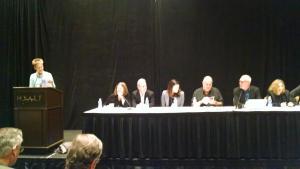By Lauren Arcuri
“What makes a journalist in 2015?” asked moderator Robin Marantz Henig, freelance journalist and president of NASW, to open the ScienceWriters 2015 panel discussion, Ethics in today’s science writing landscape: A community conversation.
The panel included Alexis Sobel Fitts, technology writer for the Huffington Post and columnist for the Columbia Journalism Review; James Marcus, executive editor at Harper’s; Mark Schrope, freelance journalist and outreach consultant; Ellen Ruppel Shell, professor and co-director, Graduate Program in Science Journalism, Boston University; Jamie Shreeve, executive editor for science, National Geographic; Lee Siegel, senior science writer, University of Utah; Erik Vance, freelance journalist; and Pam Weintraub, senior editor, Aeon.
Henig laid out the core questions at the start of the discussion: “We need to ask ourselves some big questions: how much non-journalism work does it take to no longer be considered a journalist? How do you manage conflict of interest? We want to start a conversation that will hopefully continue in the hallways of this year’s meeting.”After Henig’s introduction, Vance and Schrope took to podiums, debating with each other what is and isn’t acceptable ethics-wise when juggling both journalistic and more corporate work. Schrope argued that a freelancer can mix straight journalism work with other writing work ethically and with integrity, concluding that “though it does get into some gray areas, it can be managed.” He also mentioned that over the sixteen years he’s been freelancing, he’s been supporting a family, almost entirely on his freelance income.
Vance, however, disagreed. “Over the years I’ve come down to a pretty hard line about what affects your ability to write journalism, and to write journalism you’re happy with.” He did say he doesn’t have a family to support and lives in Mexico. “I don’t have to worry about sending three kids to college,” he said.
Vance said in his opinion, the key question is whether the writer is compromised. Can you write about corruption, poor science, or something bad about a person who is part of a company who pays you money? Do you have that freedom?
The panel gave their opinions on the ethical considerations that journalists must weigh when writing. Shreeve said, “I can’t imagine there’s a yes or no on most of these situations. Certainly the way that money plays a part with the gradual — not gradual, steep — descent of compensation for freelancers is going to bend that nuanced curve in the direction that Erik probably wouldn’t want it to go. But how can it not go?” Ruppel Shell said, “Obviously I think a lot of us where thinking, when Mark said he had three children and Erik said he has no kids and lives in Mexico, we made up our minds about where they’d fall on these things.” The audience chuckled. “We understand that journalists are always conflicted. We have to get the story.”
The rest of the session was devoted to real scenarios presented by Henig “with details changed to protect writers and editors.” Session attendees voted online, in real-time, giving their opinions were about whether there was a conflict of interest, or what a writer should do in a given situation.
The general consensus seemed to be that compromise, given today’s journalistic landscape, is inevitable, but that disclosure and transparency are critical when any potential conflict of interest exists. This means that the writer discloses any conflicts to his or her editor, and that the writer and/or editor discloses these to the readers when appropriate.
Another area where most or all agreed is that writers who do corporate work on a particular topic should stay away from that topic or field in their journalistic efforts when possible. However, Shreeve admitted this is difficult “because as you build expertise you will want to write about [that topic].”
Audience comments rounded out the conversational feel to the plenary. Freelance journalists talked about the difficulties of making ends meet while freelancing and the necessity of taking on less journalistic work. David Dobbs, a freelance journalist, pointed out that spotting your own conflicts of interest is difficult since “we’re embedded. This is why sharp lines that you don’t cross are useful, I think,” he said.
For those who want to read comments on the session, the Twitter hashtags were #sciwriethics and #sciwri15.




